Abstract
Mucopolysaccharidosis type I (i.e., Hurler, Hurler-Scheie, and Scheie syndromes) and type II (i.e., Hunter syndrome) are lysosomal storage disorders resulting from alpha-L-iduronidase (IDUA) deficiency and iduronate-2-sulfatase (IDS) deficiency, respectively. The a priori probability that both disorders would occur in a single individual is approximately 1 in 5 billion. Nevertheless, such a proband was referred for whom clinical findings (i.e., a male with characteristic facies, dysostosis multiplex, and mental retardation) and biochemical tests indicated these concomitant diagnoses. In repeated studies, leukocyte 4 methylumbelliferyl-alpha-L-iduronidase activities in this kindred were as follows: <1.0 nmol/mg protein/h in the proband and proband's clinically normal sister; 45.3 in mother; and 45.7 in father (normal range 65.0-140). Leukocyte L-O-(alpha-iduronate-2-sulfate)-(1->4)-D-O-2,5-anhydro[1-3H]mannitol-6- sulfate activities were as follows: 0.0 U/mg protein/h in the proband; 5.7 in his sister; 4.9 in mother; and 15.0 in father (normal range 11.0-18.4). Multiple techniques, including automated sequencing of the entire IDS and IDUA coding regions, were employed to unravel the molecular genetic basis of these intriguing observations. The common IDS mutation R468W was identified in the proband, his mother, and his sister, thus explaining their biochemical phenotypes. Additionally, the proband, his sister, and his father were found to be heterozygous for a common IDUA mutation, W402X. Notably, a new IDUA mutation A300T was also identified in the proband, his sister, and his mother, accounting for reduced IDUA activity in these individuals; the asymptomatic sister, whose cells demonstrated normal glycosaminoglycan metabolism, is thus a compound heterozygote for W402X and the new allele. This A300T mutation is the first IDUA pseudodeficiency gene to be elucidated at the molecular level.
Full text
PDF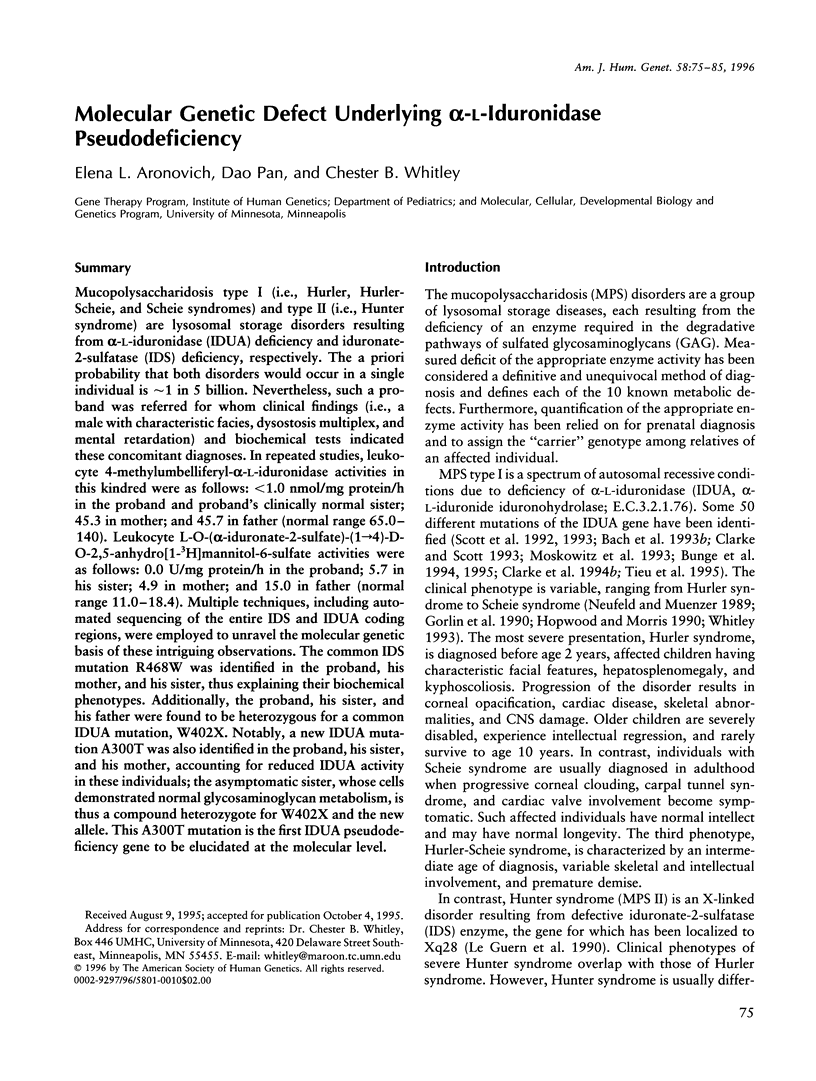
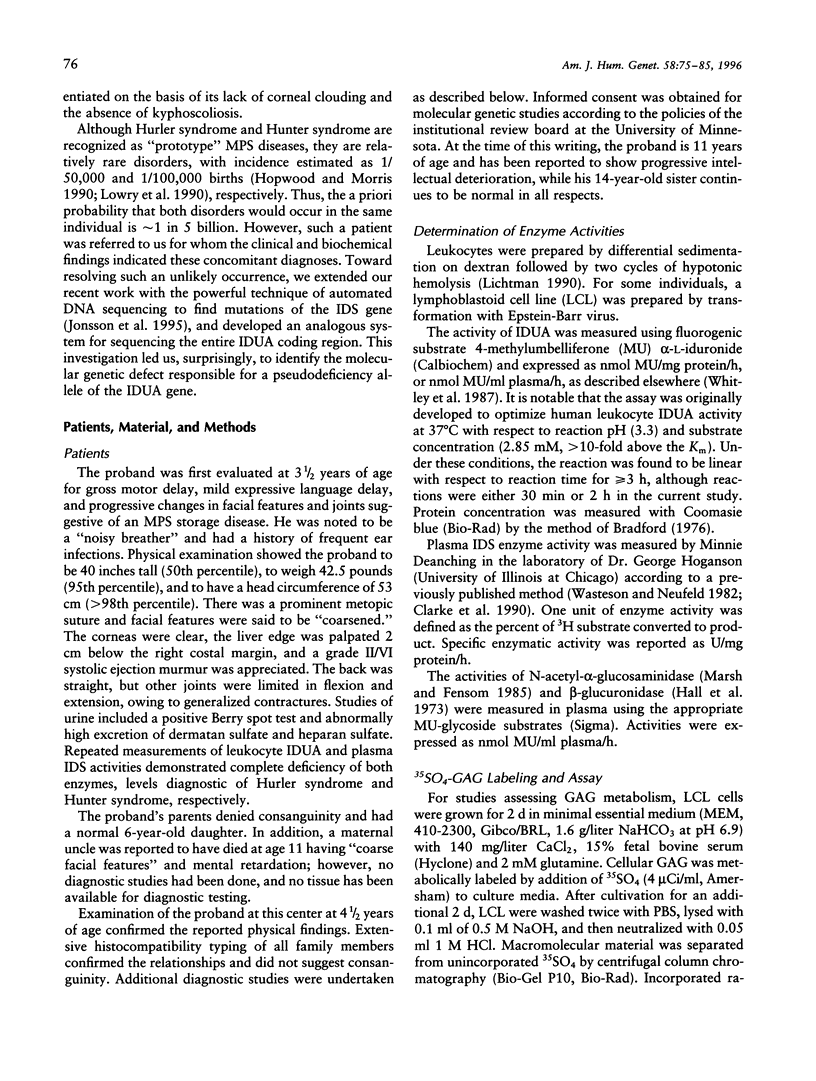
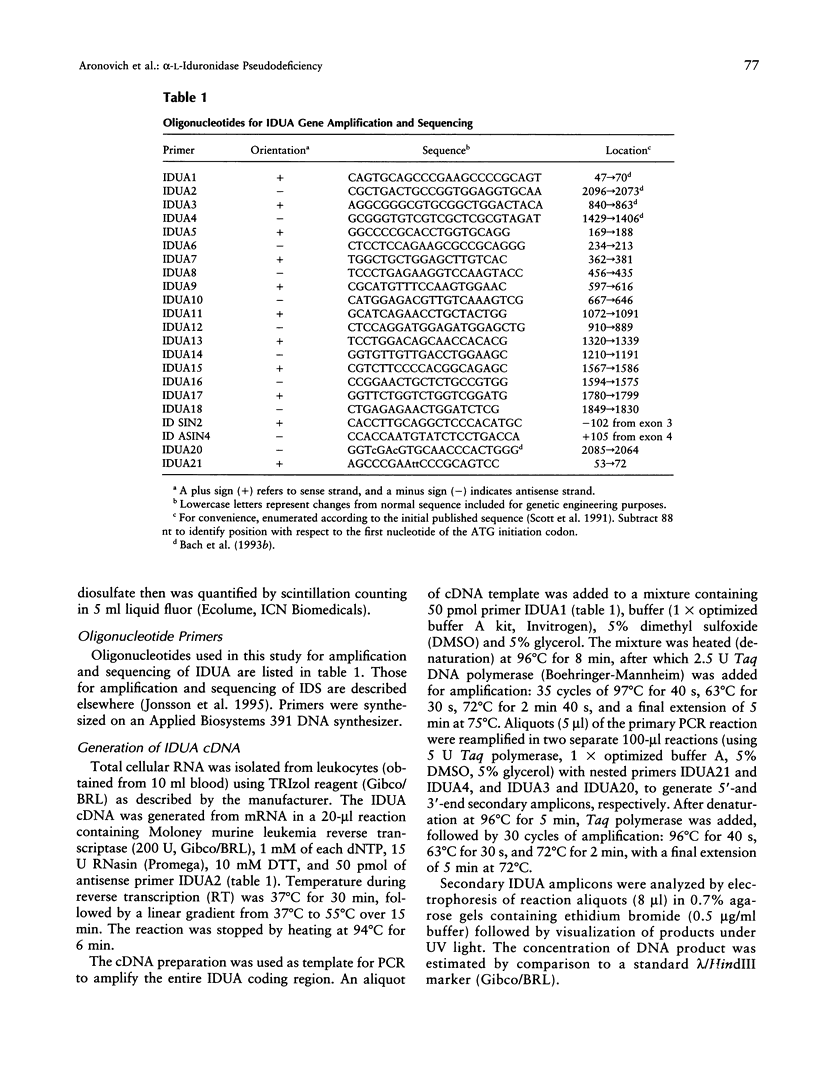
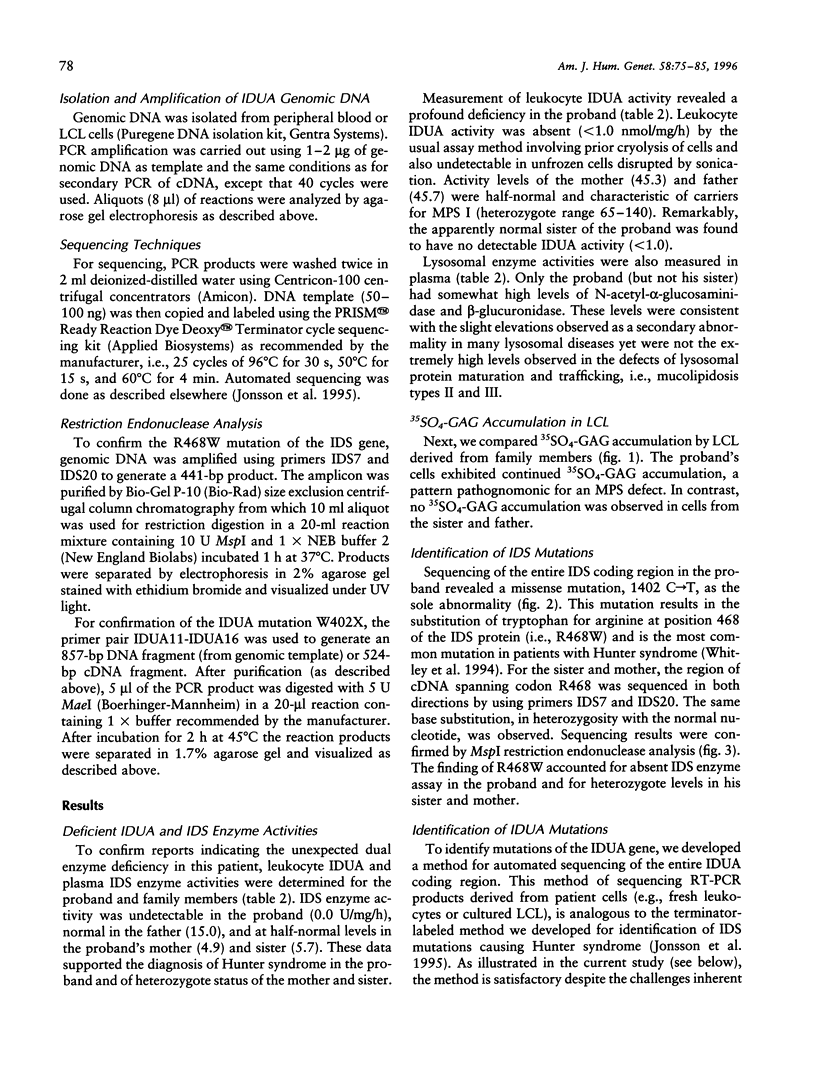
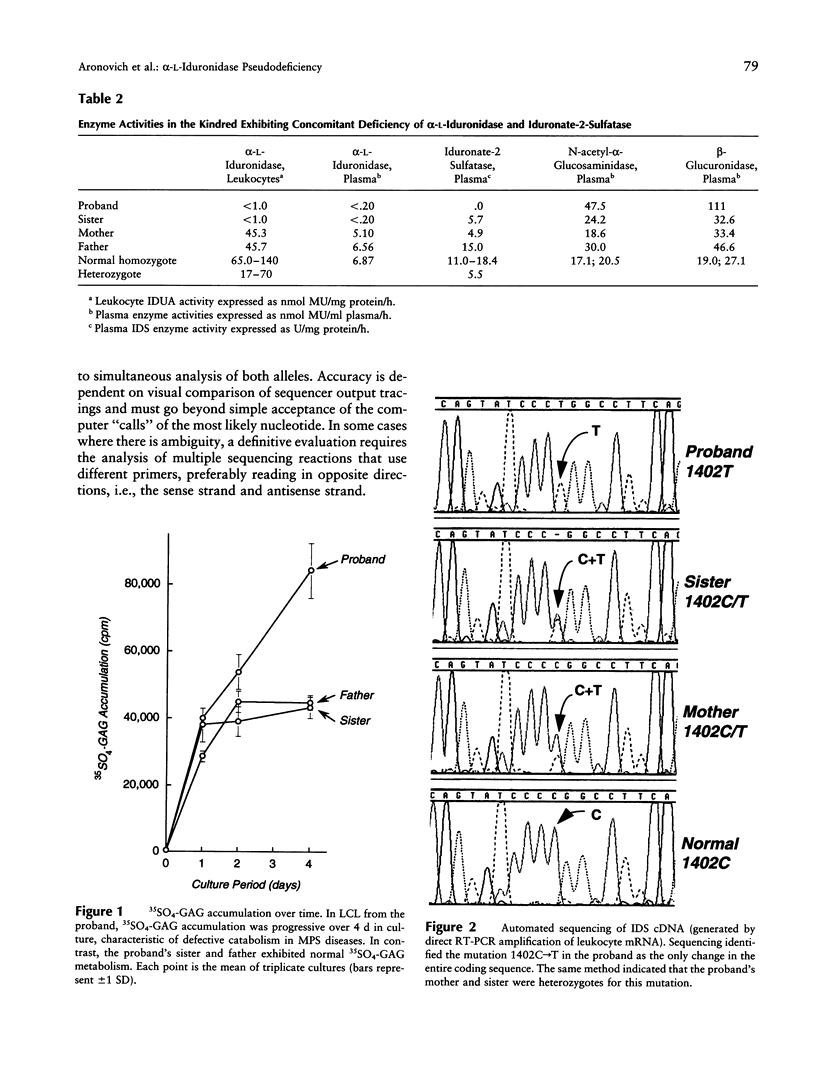
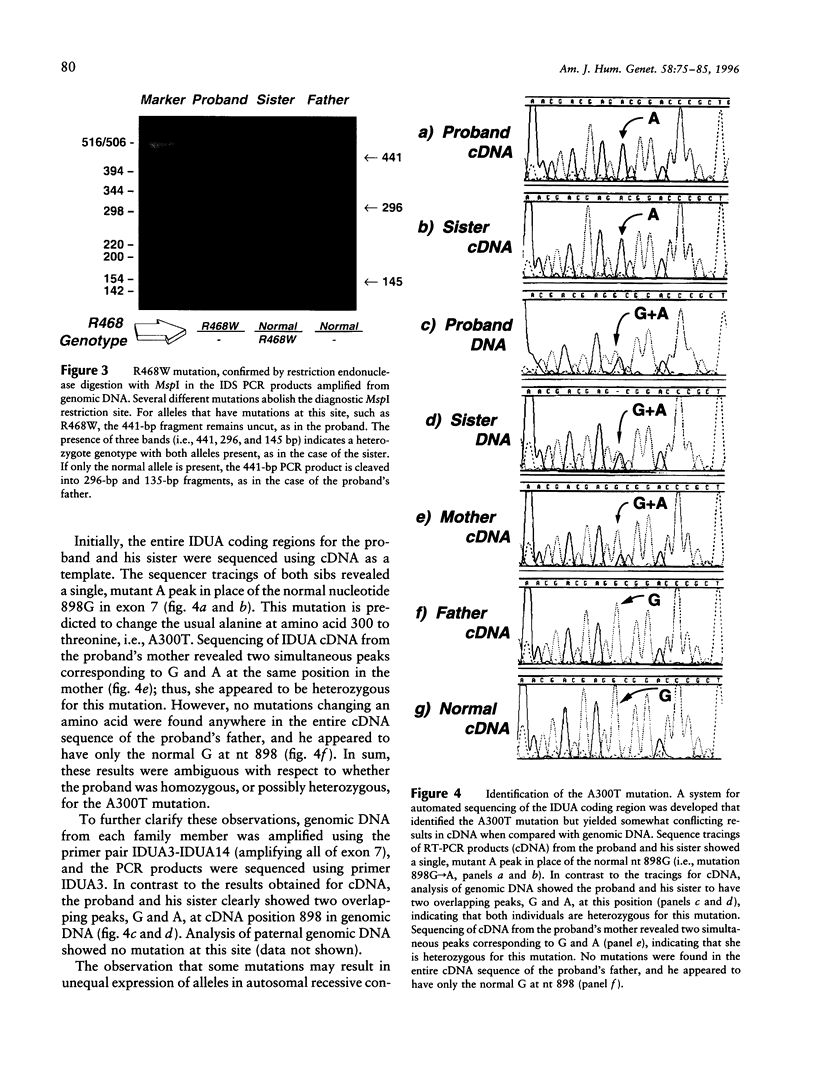
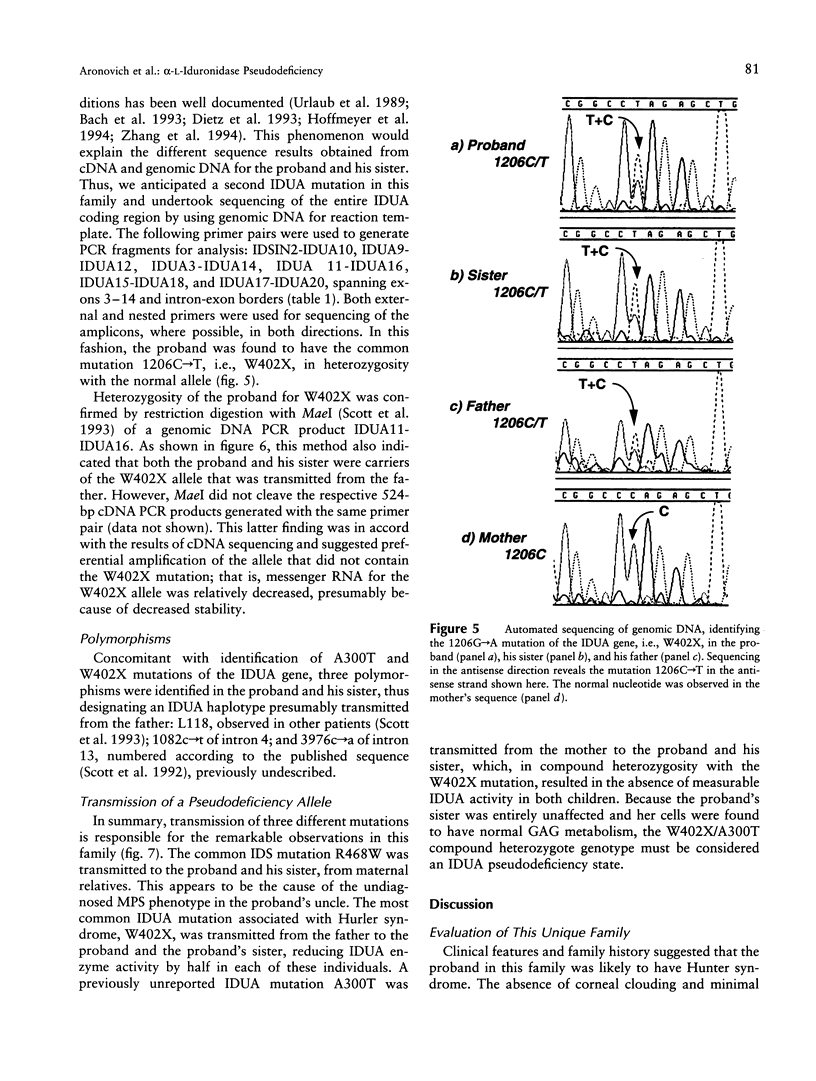
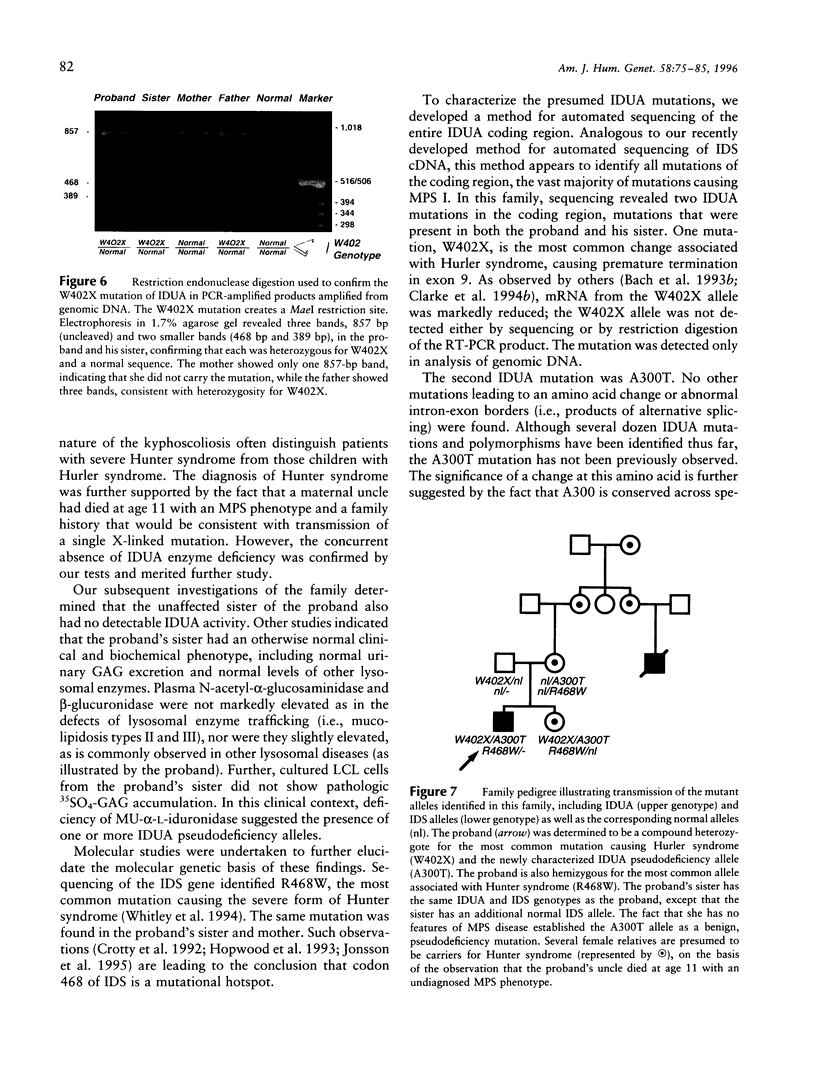
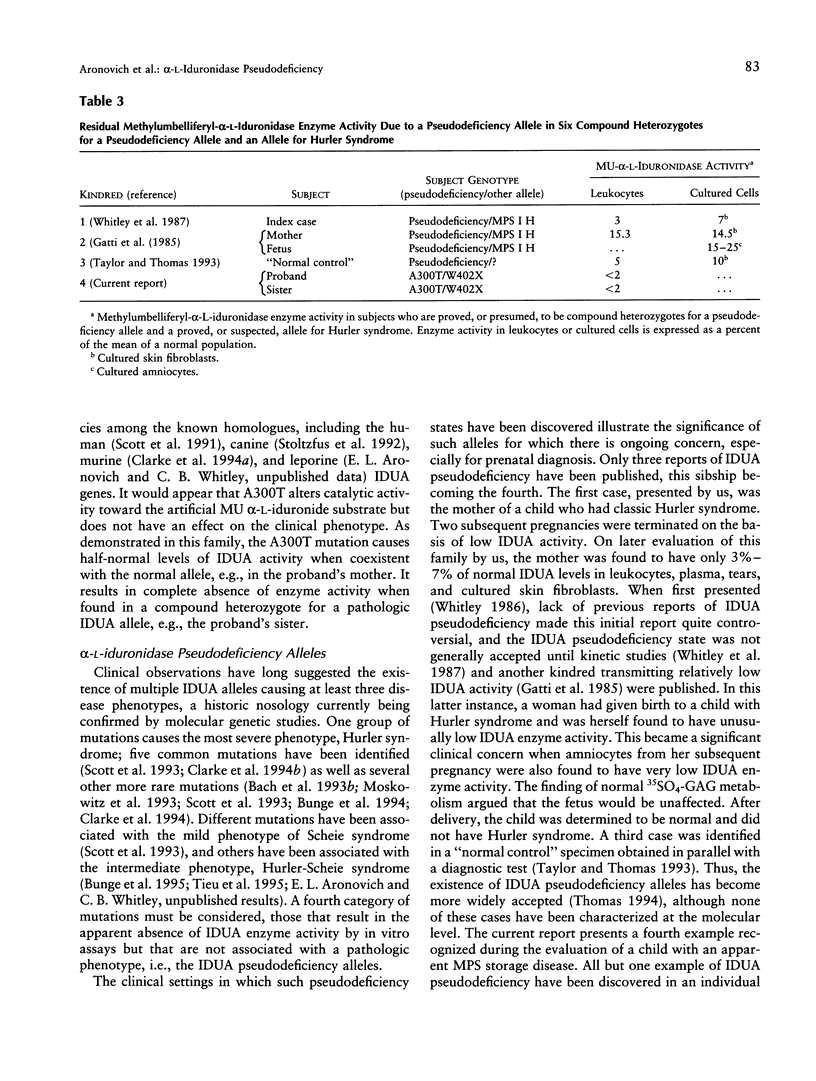
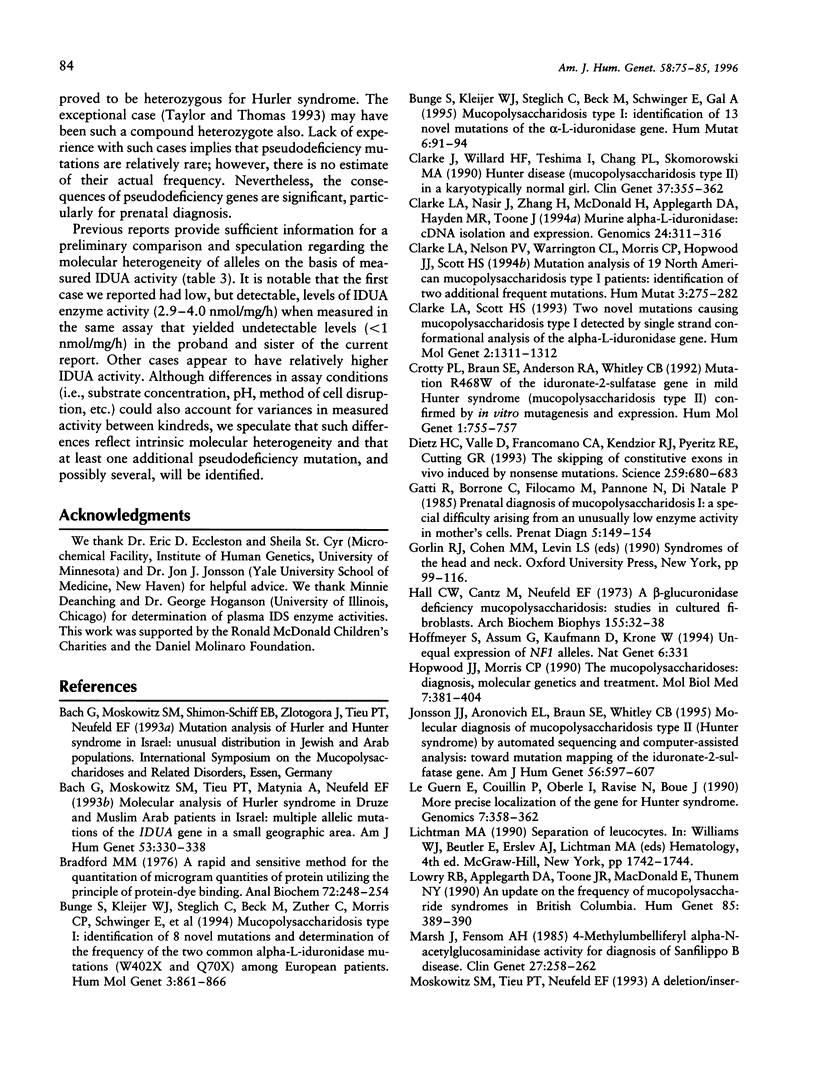
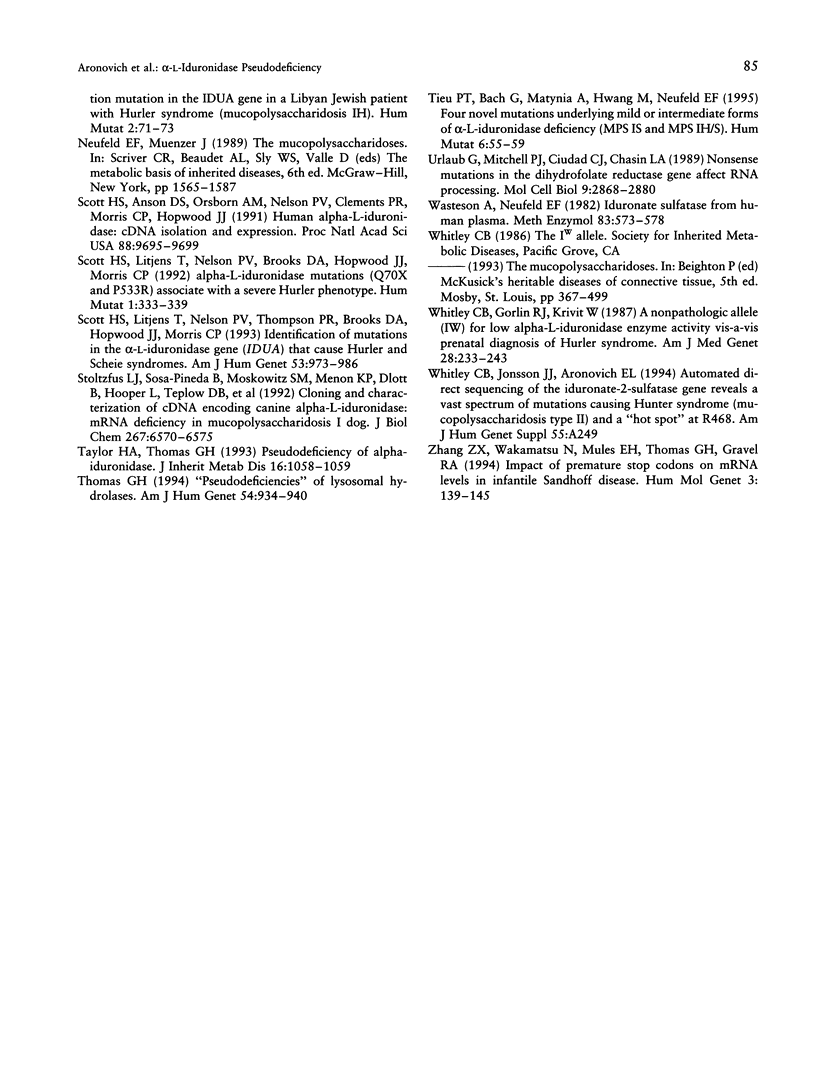
Images in this article
Selected References
These references are in PubMed. This may not be the complete list of references from this article.
- Bach G., Moskowitz S. M., Tieu P. T., Matynia A., Neufeld E. F. Molecular analysis of Hurler syndrome in Druze and Muslim Arab patients in Israel: multiple allelic mutations of the IDUA gene in a small geographic area. Am J Hum Genet. 1993 Aug;53(2):330–338. [PMC free article] [PubMed] [Google Scholar]
- Bradford M. M. A rapid and sensitive method for the quantitation of microgram quantities of protein utilizing the principle of protein-dye binding. Anal Biochem. 1976 May 7;72:248–254. doi: 10.1006/abio.1976.9999. [DOI] [PubMed] [Google Scholar]
- Bunge S., Kleijer W. J., Steglich C., Beck M., Schwinger E., Gal A. Mucopolysaccharidosis type I: identification of 13 novel mutations of the alpha-L-iduronidase gene. Hum Mutat. 1995;6(1):91–94. doi: 10.1002/humu.1380060119. [DOI] [PubMed] [Google Scholar]
- Bunge S., Kleijer W. J., Steglich C., Beck M., Zuther C., Morris C. P., Schwinger E., Hopwood J. J., Scott H. S., Gal A. Mucopolysaccharidosis type I: identification of 8 novel mutations and determination of the frequency of the two common alpha-L-iduronidase mutations (W402X and Q70X) among European patients. Hum Mol Genet. 1994 Jun;3(6):861–866. doi: 10.1093/hmg/3.6.861. [DOI] [PubMed] [Google Scholar]
- Clarke J. T., Willard H. F., Teshima I., Chang P. L., Skomorowski M. A. Hunter disease (mucopolysaccharidosis type II) in a karyotypically normal girl. Clin Genet. 1990 May;37(5):355–362. doi: 10.1111/j.1399-0004.1990.tb03519.x. [DOI] [PubMed] [Google Scholar]
- Clarke L. A., Nasir J., Zhang H., McDonald H., Applegarth D. A., Hayden M. R., Toone J. Murine alpha-L-iduronidase: cDNA isolation and expression. Genomics. 1994 Nov 15;24(2):311–316. doi: 10.1006/geno.1994.1621. [DOI] [PubMed] [Google Scholar]
- Clarke L. A., Nelson P. V., Warrington C. L., Morris C. P., Hopwood J. J., Scott H. S. Mutation analysis of 19 North American mucopolysaccharidosis type I patients: identification of two additional frequent mutations. Hum Mutat. 1994;3(3):275–282. doi: 10.1002/humu.1380030316. [DOI] [PubMed] [Google Scholar]
- Clarke L. A., Scott H. S. Two novel mutations causing mucopolysaccharidosis type I detected by single strand conformational analysis of the alpha-L-iduronidase gene. Hum Mol Genet. 1993 Aug;2(8):1311–1312. doi: 10.1093/hmg/2.8.1311. [DOI] [PubMed] [Google Scholar]
- Crotty P. L., Braun S. E., Anderson R. A., Whitley C. B. Mutation R468W of the iduronate-2-sulfatase gene in mild Hunter syndrome (mucopolysaccharidosis type II) confirmed by in vitro mutagenesis and expression. Hum Mol Genet. 1992 Dec;1(9):755–757. doi: 10.1093/hmg/1.9.755. [DOI] [PubMed] [Google Scholar]
- Dietz H. C., Valle D., Francomano C. A., Kendzior R. J., Jr, Pyeritz R. E., Cutting G. R. The skipping of constitutive exons in vivo induced by nonsense mutations. Science. 1993 Jan 29;259(5095):680–683. doi: 10.1126/science.8430317. [DOI] [PubMed] [Google Scholar]
- Gatti R., Borrone C., Filocamo M., Pannone N., Di Natale P. Prenatal diagnosis of mucopolysaccharidosis I: A special difficulty arising from an unusually low enzyme activity in mother's cells. Prenat Diagn. 1985 Mar-Apr;5(2):149–154. doi: 10.1002/pd.1970050209. [DOI] [PubMed] [Google Scholar]
- Hall C. W., Cantz M., Neufeld E. F. A -glucuronidase deficiency mucopolysaccharidosis: studies in cultured fibroblasts. Arch Biochem Biophys. 1973 Mar;155(1):32–38. doi: 10.1016/s0003-9861(73)80006-2. [DOI] [PubMed] [Google Scholar]
- Hoffmeyer S., Assum G., Kaufmann D., Krone W. Unequal expression of NF1 alleles. Nat Genet. 1994 Apr;6(4):331–331. doi: 10.1038/ng0494-331. [DOI] [PubMed] [Google Scholar]
- Hopwood J. J., Morris C. P. The mucopolysaccharidoses. Diagnosis, molecular genetics and treatment. Mol Biol Med. 1990 Oct;7(5):381–404. [PubMed] [Google Scholar]
- Jonsson J. J., Aronovich E. L., Braun S. E., Whitley C. B. Molecular diagnosis of mucopolysaccharidosis type II (Hunter syndrome) by automated sequencing and computer-assisted interpretation: toward mutation mapping of the iduronate-2-sulfatase gene. Am J Hum Genet. 1995 Mar;56(3):597–607. [PMC free article] [PubMed] [Google Scholar]
- Le Guern E., Couillin P., Oberlé I., Ravise N., Boue J. More precise localization of the gene for Hunter syndrome. Genomics. 1990 Jul;7(3):358–362. doi: 10.1016/0888-7543(90)90169-u. [DOI] [PubMed] [Google Scholar]
- Lowry R. B., Applegarth D. A., Toone J. R., MacDonald E., Thunem N. Y. An update on the frequency of mucopolysaccharide syndromes in British Columbia. Hum Genet. 1990 Aug;85(3):389–390. doi: 10.1007/BF00206770. [DOI] [PubMed] [Google Scholar]
- Marsh J., Fensom A. H. 4-Methylumbelliferyl alpha-N-acetylglucosaminidase activity for diagnosis of Sanfilippo B disease. Clin Genet. 1985 Mar;27(3):258–262. doi: 10.1111/j.1399-0004.1985.tb00217.x. [DOI] [PubMed] [Google Scholar]
- Moskowitz S. M., Tieu P. T., Neufeld E. F. A deletion/insertion mutation in the IDUA gene in a Libyan Jewish patient with Hurler syndrome (mucopolysaccharidosis IH). Hum Mutat. 1993;2(1):71–73. doi: 10.1002/humu.1380020113. [DOI] [PubMed] [Google Scholar]
- Scott H. S., Anson D. S., Orsborn A. M., Nelson P. V., Clements P. R., Morris C. P., Hopwood J. J. Human alpha-L-iduronidase: cDNA isolation and expression. Proc Natl Acad Sci U S A. 1991 Nov 1;88(21):9695–9699. doi: 10.1073/pnas.88.21.9695. [DOI] [PMC free article] [PubMed] [Google Scholar]
- Scott H. S., Litjens T., Nelson P. V., Brooks D. A., Hopwood J. J., Morris C. P. alpha-L-iduronidase mutations (Q70X and P533R) associate with a severe Hurler phenotype. Hum Mutat. 1992;1(4):333–339. doi: 10.1002/humu.1380010412. [DOI] [PubMed] [Google Scholar]
- Scott H. S., Litjens T., Nelson P. V., Thompson P. R., Brooks D. A., Hopwood J. J., Morris C. P. Identification of mutations in the alpha-L-iduronidase gene (IDUA) that cause Hurler and Scheie syndromes. Am J Hum Genet. 1993 Nov;53(5):973–986. [PMC free article] [PubMed] [Google Scholar]
- Stoltzfus L. J., Sosa-Pineda B., Moskowitz S. M., Menon K. P., Dlott B., Hooper L., Teplow D. B., Shull R. M., Neufeld E. F. Cloning and characterization of cDNA encoding canine alpha-L-iduronidase. mRNA deficiency in mucopolysaccharidosis I dog. J Biol Chem. 1992 Apr 5;267(10):6570–6575. [PubMed] [Google Scholar]
- Taylor H. A., Thomas G. H. Pseudodeficiency of alpha-iduronidase. J Inherit Metab Dis. 1993;16(6):1058–1059. doi: 10.1007/BF00711533. [DOI] [PubMed] [Google Scholar]
- Thomas G. H. "Pseudodeficiencies" of lysosomal hydrolases. Am J Hum Genet. 1994 Jun;54(6):934–940. [PMC free article] [PubMed] [Google Scholar]
- Tieu P. T., Bach G., Matynia A., Hwang M., Neufeld E. F. Four novel mutations underlying mild or intermediate forms of alpha-L-iduronidase deficiency (MPS IS and MPS IH/S). Hum Mutat. 1995;6(1):55–59. doi: 10.1002/humu.1380060111. [DOI] [PubMed] [Google Scholar]
- Urlaub G., Mitchell P. J., Ciudad C. J., Chasin L. A. Nonsense mutations in the dihydrofolate reductase gene affect RNA processing. Mol Cell Biol. 1989 Jul;9(7):2868–2880. doi: 10.1128/mcb.9.7.2868. [DOI] [PMC free article] [PubMed] [Google Scholar]
- Wasteson A., Neufeld E. F. Iduronate sulfatase from human plasma. Methods Enzymol. 1982;83:573–578. doi: 10.1016/0076-6879(82)83053-x. [DOI] [PubMed] [Google Scholar]
- Whitley C. B., Gorlin R. J., Krivit W. A nonpathologic allele (IW) for low alpha-L-iduronidase enzyme activity vis-a-vis prenatal diagnosis of Hurler syndrome. Am J Med Genet. 1987 Sep;28(1):233–243. doi: 10.1002/ajmg.1320280136. [DOI] [PubMed] [Google Scholar]
- Zhang Z. X., Wakamatsu N., Mules E. H., Thomas G. H., Gravel R. A. Impact of premature stop codons on mRNA levels in infantile Sandhoff disease. Hum Mol Genet. 1994 Jan;3(1):139–145. doi: 10.1093/hmg/3.1.139. [DOI] [PubMed] [Google Scholar]




